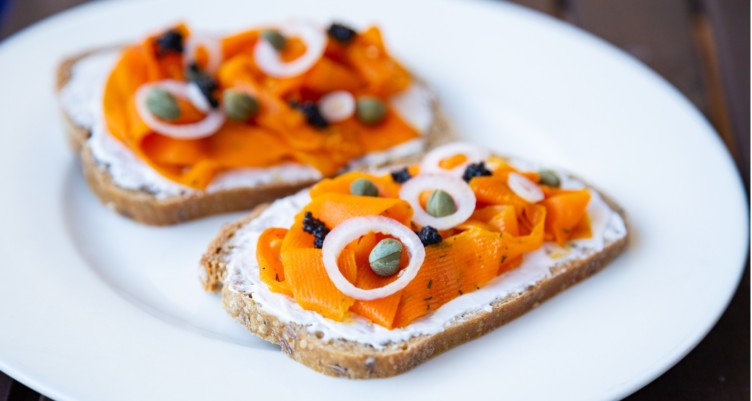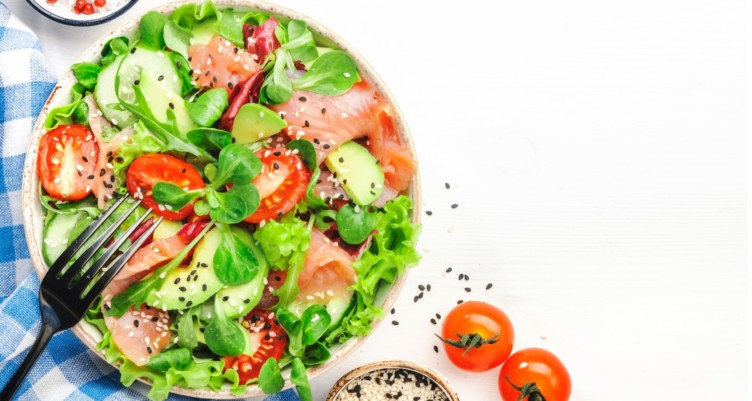Spoiler Alert: Despite Popular Opinion, Plant-Based Salmon Isn’t the Solution

Whether you like to eat raw salmon in a freshly wrapped sushi roll or you’d rather let it simmer away in a spicy Thai coconut sauce until it’s fork-tender, there’s no doubt this fish is a terrific source of protein and omega-3 fatty acids. However, as one of the most popular seafood products consumed around the world, the unfortunate reality is that we have a bit of a salmon shortage on our hands. Plus, with more people embracing a vegan or vegetarian lifestyle, the demand for an alternative is on the rise.
That begs the all-important question: Is plant-based salmon a solution to all of these problems?
Once you dive deeper into the waters of the “plant-based vs. the real thing” argument, it’s clear substituting this delicious and nutritious fish for something made out of veggies just doesn’t cut it.
Unpacking the Salmon Crisis

There are a few issues at play that must be considered in any conversation about the current state of the salmon market.
First, empty oceans have become a legitimate concern. Overfishing has resulted in a significant reduction in the amount of marine life, and that obviously doesn’t bode well for those who love eating seafood. Throw in the fact that microplastics and other forms of pollution continue to wreak havoc on our oceans and it’s obvious that we aren’t doing a great job protecting and preserving the environment in which fish and other sea creatures thrive.
In addition to those issues, the salmon crisis involves another highly-debated topic: wild caught vs. farm raised.
For some, the only acceptable form of salmon to consume is one that’s caught straight from the ocean or a river. On the other hand, farm-raised fish have become more popular over the years. Still, the concept of eating a fish raised in a non-natural environment may not sit well with some consumers.
Plant-Based Salmon: The New Frontier

Times are changing, and so are the types of foods we consume. While prior generations probably never dreamt of the term “plant-based salmon,” it’s here and it doesn’t look like it’s going away anytime soon.
In fact, salmon isn’t the only seafood that’s been made using ingredients that you might ordinarily find in the produce section of your grocery store. Tuna made of tomatoes and “fishless” fish sticks are examples of plant-based seafood products that have grown in popularity. Several brands offer plant-based alternatives that attempt to mimic the signature appearance, taste and mouthfeel of salmon.
For example, a French company called Ondontella offers an algae-based product called Solmon that’s 100% vegan. Meanwhile, Save Da Sea Foods, a vegan seafood company based in Victoria, British Columbia, offers a smoked salmon product made from carrots.
These plant-based salmon solutions will find their way into classic fish-inspired dishes like sushi, lox on bagels and even faux fish dips. Still, it’s certainly quite a bit different to consume a piece of sushi made with tomato-based salmon rather than the real thing.
Then again, with plant-based proteins trending upward due to concerns about the quality of meats and the impact on the environment, it makes sense that more companies continue to create new products that don’t actually feature fish.
Is plant-based salmon as good as the real thing?

So, is plant-based salmon on equal grounds as the one you pluck out of the open water?
The short answer: NO.
Although salmon made from algae might bring some benefits from the sea, it comes up short in some key areas. Algae-based salmon won’t have the high concentration of omega-3s provided by real salmon. It is also lacking the astaxanthin (the pink color) found in wild-caught salmon. Astaxanthin is an amazing antioxidant. Vitamin B12 may also be lacking.
Speaking of B12, it’s also important to note that vegans and vegetarians are commonly deficient in this critical vitamin. Relying on a plant-based form of salmon won’t help bridge any gaps in that regard.
Ultimately, there’s no substitution for the nutritional value of the real thing.
The bottom line: Plant-based salmon makes sense from a sustainability standpoint, but it doesn’t deliver much needed omega-3 fatty acids and other key nutrients. As much as the idea may have some merit, stick to actual salmon (sorry, faux filets!) the next time you’re thinking about having some sushi.
Want to learn more about critical omega-3 fatty acids? Discover the difference between krill oil vs. fish oil so you can make sure your body gets what it needs to keep your cells in top shape.
Sign up for early access to sales, product launches, the latest Bulletproof news and more!



